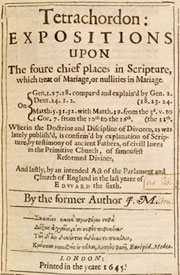|
|
|
|
 | John Milton |

SONNET XI.
ON THE DETRACTION WHICH FOLLOWED UPON
THE WRITING OF CERTAIN TREATISES.*
A BOOK was writ of late called Tetrachordon,
And woven close, both matter, form, and style;
The subject new: it walk'd the town awhile,
Numb'ring good intellects; now seldom por'd on.
Cries the stall-reader, Bless us! what a word on
A title-page is this! and some in file
Stand spelling false, while one might walk to Mile-
End Green. Why is it harder, Sirs, than Gordon,,
Colkitto, or Macdonnel, or Galasp?†
Those rugged names to our like mouths grow sleek,
That would have made Quintillian stare and gasp;
Thy age, like ours O soul of Sir John Cheek,‡
Hated not learning worse than toad or asp,
When thou taught'st Cambridge, and King Edward, Greek.
| |
5
10
|
* When Milton published his book of Divorce, he was greatly condemned by the Presbyterian ministers, whose advocate and champion he had been before. He published his Tetrachordon, or Expositions upon the four chief places in Scripture, which treat of marriage, or nullities in marriage, in 1645.
† "We may suppose, (says Dr. Newton,) that these were persons of note and eminence among the Scotch ministers who were for pressing and enforcing the convenant." Mr. George Gillespie, here wrongously named Galasp, was one of the Scotch commissioners to the Westminster assembly. But who the other persons were is not known. It appears from this sonnet, and the verses on the forcers of conscience, that Milton treats the Presbyterians with great contempt.
‡ This Gentleman was the first Professor of the Greek tongue in the university of Cambridge, and was highly instrumental in bringing that language into repute. He was afterwards made one of the tutors to Edward VI.
|
The Complete Poems of John Milton. Vol 4.
Charles W. Eliot, ed.
New York: P. F. Collier & Son, 1909. 81.
 | to Works of John Milton |
Site copyright ©1996-2012 Anniina Jokinen. All Rights Reserved.
Created by Anniina Jokinen
on October 9, 1996. Last updated April 26, 2012.
|
|
|